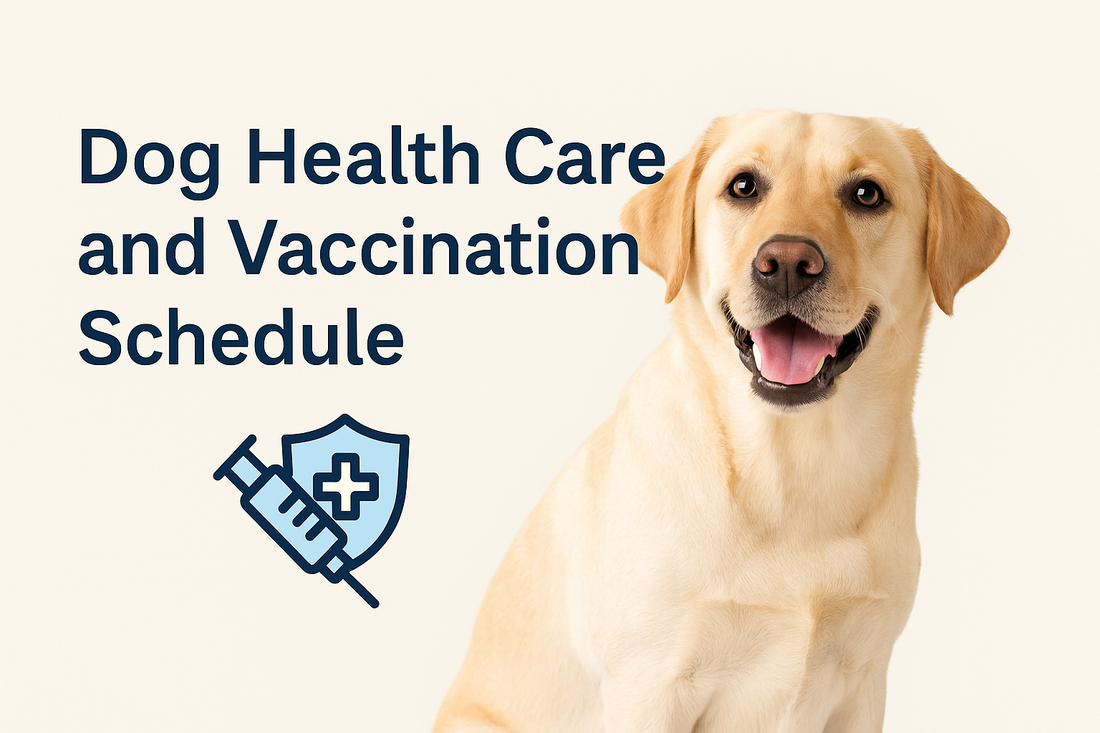
🐶 Dog Health Care and Vaccination Schedule – Complete Guide for Pet Owners
Dog Health Care and Vaccination Schedule – Complete Guide for Pet Owners
Why Are Dog Health Care and Vaccinations So Important?
Following a proper dog vaccination schedule is crucial because puppies are born with underdeveloped immune systems, making them highly vulnerable to viral infections, parasites, and respiratory illnesses.
Regular health care and timely vaccinations are critical to protecting a puppy’s life.
Vaccinations are also essential for public health, especially when your dog interacts with other animals or people outdoors.
Essential Dog Vaccines Included in the Dog Vaccination Schedule
🦠 1. Core Combination Vaccine (DHPPL)
-
Distemper (D), Hepatitis (H), Parvovirus (P), Parainfluenza (P), Leptospirosis (L)
-
First dose at 6 weeks of age, followed by 5 series in total
🐾 2. Canine Coronavirus Vaccine
-
Protects against gastrointestinal infections similar to parvovirus
-
Administered based on local outbreak risk
🐶 3. Kennel Cough Vaccine (Bordetella)
-
Prevents infectious canine tracheobronchitis
-
Essential for dogs attending daycare, boarding, or grooming facilities
🐕 4. Rabies Vaccine
-
Protects against a fatal zoonotic disease
-
Legally mandatory in many regions; must be administered before outdoor exposure
🐍 5. Optional Vaccines
-
Canine influenza, Lyme disease (tick-borne illness), and others depending on your region and lifestyle
Dog Vaccination Schedule Summary by Age
| Age | Vaccines |
|---|---|
| 6 weeks | Core vaccine 1st dose (DHPPL) |
| 8 weeks | Core vaccine 2nd dose + Coronavirus |
| 10 weeks | Core vaccine 3rd dose + Kennel Cough |
| 12 weeks | Core vaccine 4th dose + Rabies |
| 16 weeks | Core vaccine 5th (final) dose |
| Annually | Core vaccine + Rabies booster every year |
Note: Schedules may vary slightly by veterinarian recommendation.
Dog Health Care Essentials to Support the Vaccination Schedule
✅ 1. Regular Health Checkups
-
At least twice within the first six months
-
Then annually for early disease detection
✅ 2. Deworming and Parasite Prevention
-
Internal parasites (roundworms, tapeworms): deworming from 2 weeks of age
-
External parasites (fleas, ticks): monthly prevention using collars, spot-on treatments, or oral medications
✅ 3. Balanced Nutrition
-
Age- and breed-appropriate dog food
-
Maintain ideal weight to support immunity
✅ 4. Physical and Mental Stimulation
-
Daily walks and interactive play
-
Prevents anxiety and stress
✅ 5. Vaccination Record Keeping
-
Keep vaccination certificates organized
-
Necessary for boarding, grooming, and travel
🛒 Recommended Products for Dog Health Management
-
Dog health logbooks or vaccination tracking apps
-
Flea and tick preventatives
-
Tailored supplements (immune boosters, joint support, skin health)
👉 Explore our Complete Dog Health Care Products
External Resource (DoFollow)
For more detailed information, refer to AVMA – Vaccinations for Your Dog.
Internal Resource
👉 Related article: Dog Digestive Care – Causes and Recovery Tips
🧩 Frequently Asked Questions (FAQ)
Q1. What happens if I miss a vaccination for my dog?
A1. Delaying a vaccination can weaken the immune protection.
Always consult your vet if you miss a scheduled shot to determine whether a catch-up dose is needed.
Q2. What side effects should I watch for after vaccination?
A2. Mild side effects like slight fever or lethargy are common.
Seek veterinary help immediately if you notice vomiting, facial swelling, breathing difficulty, or severe allergic reactions.
Q3. Which vaccines are required every year?
A3. The core vaccine (DHPPL) and the rabies vaccine are generally recommended annually for ongoing protection.
Q4. What happens if I miss a vaccination?
A4. If you miss a scheduled shot in the dog vaccination schedule, your dog’s immunity may weaken, requiring a booster under veterinary guidance.
🛡️ Post-Vaccination Care Tips and Foods to Boost Immunity in Dogs
✅ Important Care After Vaccination
After your dog receives vaccinations, it’s important to monitor them closely for any potential side effects and support their recovery:
-
Monitor for mild side effects:
Minor swelling at the injection site, mild fever, or lethargy is normal and usually resolves within 24–48 hours. -
Avoid intense physical activity:
Rest is important after vaccination. Postpone vigorous walks, training, or play for at least 1–2 days. -
Keep the environment calm and stress-free:
Stress can weaken immune response. Provide a quiet, comfortable space for recovery. -
Do not self-medicate:
Never give over-the-counter painkillers or other human medications unless specifically prescribed by your vet. -
Observe for severe reactions:
Symptoms such as facial swelling, difficulty breathing, vomiting, or collapse require immediate veterinary attention.
🥦 Recommended Foods to Boost Immunity After Vaccination
A strong immune system can help your dog recover more efficiently after vaccinations.
Here are some foods that can naturally support immune health:
-
Cooked lean meats (chicken, turkey)
High-quality protein to repair and strengthen body tissues. -
Pumpkin (plain, unsweetened)
Rich in fiber, vitamins A and C, which support digestion and immunity. -
Blueberries and cranberries
Packed with antioxidants to protect cells and support immune function. -
Sweet potatoes
High in beta-carotene and vitamin E, both essential for immune defense. -
Plain probiotic yogurt
Supports gut health, which is closely linked to immune system strength. -
Omega-3 fatty acids (from fish oil)
Help reduce inflammation and enhance immune responses.
⚠️ Foods to Avoid After Vaccination
-
Avoid fatty, greasy foods that can strain digestion.
-
Avoid offering new, unfamiliar foods immediately after vaccinations to prevent gastrointestinal upset.
-
No raw foods unless part of an established, vet-approved diet.

